RE: The Power of HOA's and a letter for homeowners. Should you Beware before you give or sign your Consent away? Real life experiences!
Once again this is an attorney, who aides people with overbearing HOA's.
This is from a local news segment and the attorney is David Kahn
This is from KPRC 2 out of Houston
It is difficult to find attorneys to represent free speech and homeowners over institutions.
On how HOA's have abused authority and what you can do!
2 recourses if they bully, target you or are abusive
- you can take them to court
- long term better approach according to David is to vote the bullies out.
It has been found that sometimes it is difficult to vote the offenders out especially if you have run away HOA boards or even runaway individuals, who almost become somewhat dictatorial in what their neighbors want to do.
There is an HOA Reform Coalition
They try to confirm important protection to Homeowners.
People need their state legislature to pass the initial round of due process protections to keep people from having their homes sold out from under them as David gives evidence of this having happened to people before.
The idea is to seek to protect other homeowners from being in this situation.
David has found that if the board is intent on extending it's power, near to the election they will send out a lot of violation notices.
People in subdivisions sometimes think they cannot vote if they received a violation notice, but your state laws protect you and you ARE allowed to vote even IF you received a yellow post card or violation notice.
Are there term limits for HOA Boards?
Some believe this is not regulated.
According to David, the people who are usually opposed to things like term limits and are opposed to homeowners and like having more power for the HOA are lawyers and property management companies who make their living [often a very good living] charging homeowners lots of money for from David's perspective, relatively limited benefits.
David as an attorney calls this a foreclosure factory.
- Where even if you owe a small amount of money to your association, the attorneys will rapidly charge you as much as $3,000 when you get sued.
- A Proposal of the Coalition is to find a solution so the associations can get what they are owed rapidly,
which can range from $200 to $600 in a subdivision - so keep the income stream flowing Without the attorneys getting involved and collecting exorbitant fees.
Homeowners do have the right to
- see records as that is what they are paying dues for.
- Contracts the association has signed
- Minutes of meetings
- Records
- Email addresses of co-owners if you want to reach out to them
- Whether they have done an audit and it is supposed to be available to homeowners.
There are some boards that with hold this information as long as they can and are aided in this by property management companies because it is to their benefit do to things covertly if they are overbearing and over reaching.
How to hold HOA's accountable when they don't do things they're already supposed to be doing.
How homeowners can help.
The HOA Reform Coalition
https://hoareformcoalition.org/
The above is done in Texas.
Here is info pertaining to Indiana
- The statute of limitations for HOA claims in Indiana is six years.
- Complaints about HOAs can be filed with the Homeowner Protection Unit of the Indiana Attorney General.
- HOA governing documents, including bylaws, must comply with state and federal laws and constitutional rights. If there is a conflict between the HOA's rules and the law, the law takes precedence.
- The Indiana Homeowners Association Act of 2009 establishes guidelines for the formation, management, and jurisdiction of HOAs in Indiana. This act covers topics such as communication procedures, grievance resolution, and information availability.
The Indiana Homeowners Association Act of 2009, also known as the HOA Act, regulates the management, creation, and function of homeowners associations (HOAs) in Indiana.
Code 32-25.5
The Indiana Homeowners Association Act regulates the creation, powers, operation, and management of homeowners associations in Indiana created after June 30, 2009. It applies specifically to homeowners associations that collect mandatory dues from members.
How can a homeowner challenge unenforceable HOA rules in Indiana?
A homeowner in Indiana can challenge unenforceable HOA rules by gathering evidence that the rule violates state or federal law, conflicts with the HOA's governing documents, or is applied inconsistently. Legal counsel can provide advice on how to proceed, which may include negotiation, mediation, or litigation.
- breach of contract claims must be filed within ten years
- To dissolve an HOA in Indiana, the association must adhere to the procedures outlined in both their governing documents and Indiana state law. This typically includes a vote by a certain percentage of members and filing the appropriate paperwork with state authorities.
governing documents regulate an HOA. Although every HOA is different, the governing documents typically include: Articles of Incorporation, Bylaws, Declaration of Covenants, Conditions and Restrictions, and other rules and regulations.
HOAs in Indiana may be subject to applicable federal laws such as:
The Americans with Disabilities Act of 1990
The Fair Housing Act
Code of Federal Regulations
HOAs may be subject to certain state laws such as:
Indiana Nonprofit Corporations Act
Indiana Condominiums Act
Indiana Fair Housing Act
Indiana Liens on Real Property
Indiana Conveyance Procedures for Real Property
See links for all here,
https://ipropertymanagement.com/laws/indiana-hoa-rules-regulations.
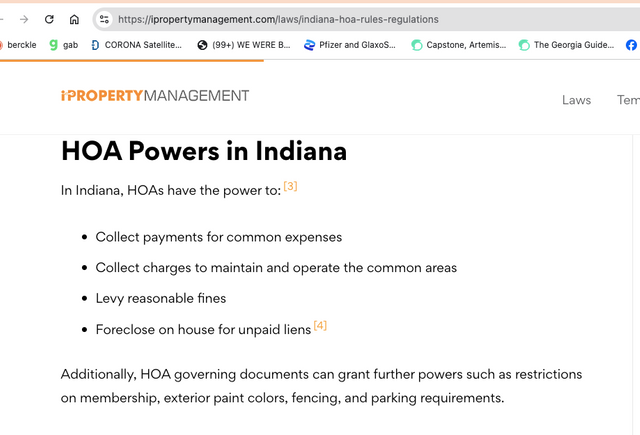
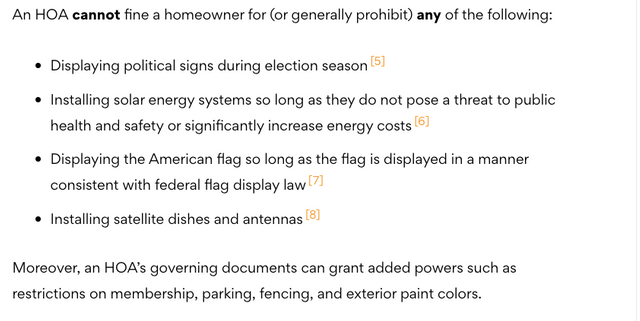
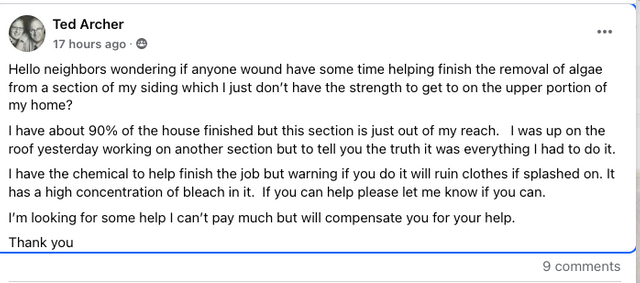
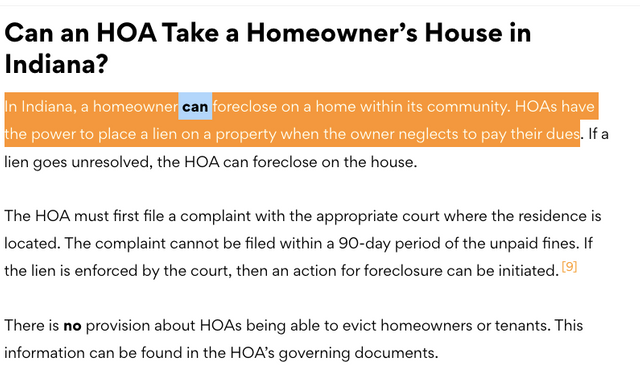
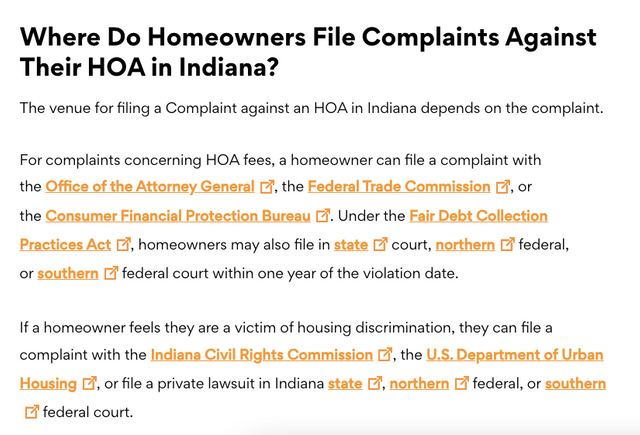
For complaints concerning HOA fees, a homeowner can file a complaint with the Office of the Attorney General, the Federal Trade Commission, or the Consumer Financial Protection Bureau. Under the Fair Debt Collection Practices Act, homeowners may also file in state court, northern federal, or southern federal court within one year of the violation date.
If a homeowner feels they are a victim of housing discrimination, they can file a complaint with the Indiana Civil Rights Commission, the U.S. Department of Urban Housing, or file a private lawsuit in Indiana state, northern federal, or southern federal court.
Otherwise, a homeowner with any other complaints can bring a claim in state court in the appropriate county.
If the majority of HOA members vote in favor of dissolution, the HOA can dissolve by filing an Articles of Dissolution with the Indiana Secretary of State.
Source
Indiana Code 25.5-2-3